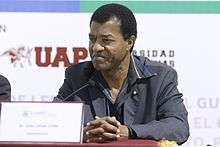Julio César Uribe
 Julio César Uribe in 2015. | |||
| Personal information | |||
|---|---|---|---|
| Full name | Julio César Uribe Flores | ||
| Date of birth | 9 May 1958 | ||
| Place of birth | Lima, Peru | ||
| Height | 1.72 m (5 ft 7 1⁄2 in) | ||
| Playing position |
Attacking midfielder Second striker | ||
| Club information | |||
Current team | (manager) | ||
| Senior career* | |||
| Years | Team | Apps | (Gls) |
| 1975–1982 | Sporting Cristal | ||
| 1982–1985 | Cagliari | 69 | (11) |
| 1985 | Sporting Cristal | ||
| 1986 | Atlético Junior | 38 | (16) |
| 1987 | América de Cali | 11 | (6) |
| 1987–1988 | América | 16 | (8) |
| 1988 | Sporting Cristal | ||
| 1989 | América de Cali | 20 | (6) |
| 1990 | Tecos UAG | 29 | (11) |
| 1991 | Sporting Cristal | ||
| 1992 | Independiente Medellín | 20 | (0) |
| 1992 | Envigado | ||
| 1993 | Mannucci | ||
| National team | |||
| 1979–1989 | Peru | 39 | (9) |
| Teams managed | |||
| 1992–1994 | Mannucci | ||
| 1995 | Deportivo Municipal | ||
| 1995 | Alianza Lima | ||
| 1996 | Tecos UAG | ||
| 1996–1997 | Atlético Junior | ||
| 1998 | Juan Aurich | ||
| 1998 | Tecos UAG | ||
| 2000 | Peru U-20 | ||
| 2000–2002 | Peru | ||
| 2002 | Tecos UAG | ||
| 2004 | Tecos UAG | ||
| 2006–2007 | Cienciano | ||
| 2007 | Peru | ||
| 2008–2009 | Cienciano | ||
| 2010 | José Gálvez | ||
| 2011–2012 | Unión Comercio | ||
| 2013–2014 | Universidad de San Martín | ||
|
* Senior club appearances and goals counted for the domestic league only. | |||
Julio César Uribe Flores (born May 9, 1958 in Lima, Peru) is a Peruvian football manager and former player.
Playing career
Club
Uribe played as an attacking midfielder or second striker. Uribe started his career with Peruvian club Sporting Cristal. Then he joined Italian club Cagliari Calcio for three seasons. After his time in Italy, Uribe returned to Sporting Cristal. He then played the following seasons with several clubs in Colombia and Mexico such as Club América. He returned to Peru in his last season as footballer to retire with C.A. Mannucci in 1992.
International
During his playing days, from 1979 to 1989, he earned 39 caps and scored 9 goals for the Peruvian national team[1] and played in the 1982 FIFA World Cup.[2]
Managerial career
Peru's National Soccer Team Coach
In 2007 he was appointed as Peru's coach, his second stint in charge as he was also the coach from 2000 to 2001. Previous to being head coach of Peru's national team, he was team coach of Cienciano del Cuzco.
On June 3, 2007, under Julio César Uribe's management, Peru had a friendly football match against Ecuador in Madrid, Spain. Peru defeated Ecuador 2-1 still giving Peru a victory over Ecuador repeatedly for over 8 years. A second friendly on June 7 was played in Barcelona, and Ecuador defeated the Peruvian team 2-0 (Both goals scored near the end of the game). Even though most agreed Peru played the better game, the saying that football matches are won by goals rather than "pretty play" was proven once more.
Uribe's next task at hand was the Copa América 2007. He was criticized for calling up a younger and somewhat more experimental squad. Nolberto Solano, a key midfielder, held his state of retirement. Peru started off on the right foot, beating Uruguay 3-0 in their opening match. However, they were not able to define in goal scoring opportunities or overcome controversial refereeing decisions in their 2-0 loss to hosts Venezuela. The surprisingly young and nimble Bolivian team also seemed on the way to beating Peru, however 2 Claudio Pizarro headers salvaged a tie for Peru. With the tie, Peru advanced into the quarter finals, but not without a scare. In the quarter finals against Argentina, they were overcome by 4 second half goals after being tied 0-0 at Halftime. Uribe was criticized for unstable formations and inadequate planning, as well as giving Argentina too much space and respect. Uribe was heavily criticized for his game planning, however Peru showed true promise against Uruguay and progress was seen under Uribe, the Copa marked what could be the beginning of a new era in Peruvian football, as they enter the South Africa 2010 qualifiers with high expectations.
Following poor results in the Copa, Uribe was fired and replaced by José del Solar in the week of July 22, 2007
Honours
Playing career
- 1979, 1980, 1988, 1991
- 1987-88
References
- ↑ Appearances for Peru National Team - RSSSF
- ↑ Julio César Uribe – FIFA competition record
External links
- Julio César Uribe at National-Football-Teams.com